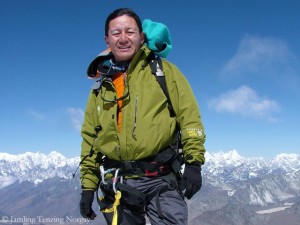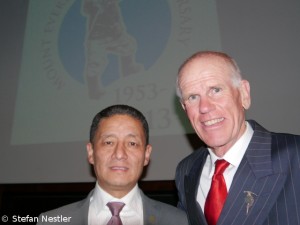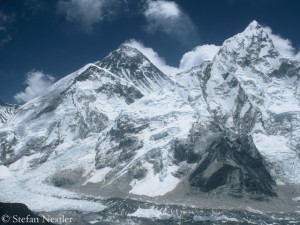Jamling Tenzing Norgay: “My father would be shocked”
I owe Jamling Tenzing Norgay my first experiences in the Himalayas. I met the son of the first man who made it to the top of Everest in 2001 when he presented his book “Touching My Father’s Soul” in Germany. In 1996, Jamling had followed in his father’s footsteps by reaching himself the summit of the highest mountain on earth. Norgay’s book was the first to discuss from the Sherpas’ point of view the May 1996 disaster on Everest, in which twelve climbers had died, most of them clients of commercial expeditions. At the end of our meeting in Munich, Jamling said: “If you want to come to Nepal someday, contact me! Then I’ll help you to organize the trip.” He kept his word. In 2002, the International Year of the Mountains, I trekked to the base camp on the Nepalese side of Everest. Today Jamling Tenzing Norgay is a sought-after speaker. I asked the 48-year-old what he expects of this year’s climbing on Mount Everest.
Jamling, we are at the start of spring season on Everest. Do you think it will be business as usual in Nepal or something different due to last year’s events?
I think that business will be as usual, everything will run the same way as it has been in the past years. My fear is that there will be more people this year due to the back log of climbers from last year and new climbers on the mountain this year. The only difference from last year is that the Sherpas will get better insurance coverage and hopefully the commercial outfitters and the local agents will have raised the pay scale of the Sherpas for this spring.
Do you feel that the mood among the members of the Sherpa community in Nepal has changed after last year’s avalanche incident and the subsequent premature end of the season?
We Sherpas are very happy and content people. Of course we mourn the loss of our Sherpa brothers who perish while climbing mountains but we continue to do what we do best and that is to climb. This is the risk that we take in our line of work.
What do think about the attitude of the operators? Have they learned from the events in 2014 or was there no need for them to change anything?
I feel that the accident in 2014 should have been a good lesson for the commercial outfitters and the local operators. The most important thing that anyone wants in life is security. We need to have a better life insurance policy for the Sherpa climbers and the pay needs to be raised.
Most importantly the children and the families need to be secure in the time of any unforeseen circumstances to the climbers. The Government of Nepal should put aside a certain percentage of the royalties collected from mountaineering expeditions into a trust to help with education of children and the families of the Sherpas that have died on the mountains.
What would your father say if he would still be alive and see what happens on Everest?
I think that he would be shocked to see how it has become so commercialized and that nowadays Everest has become a playground for the overnight mountaineers.









